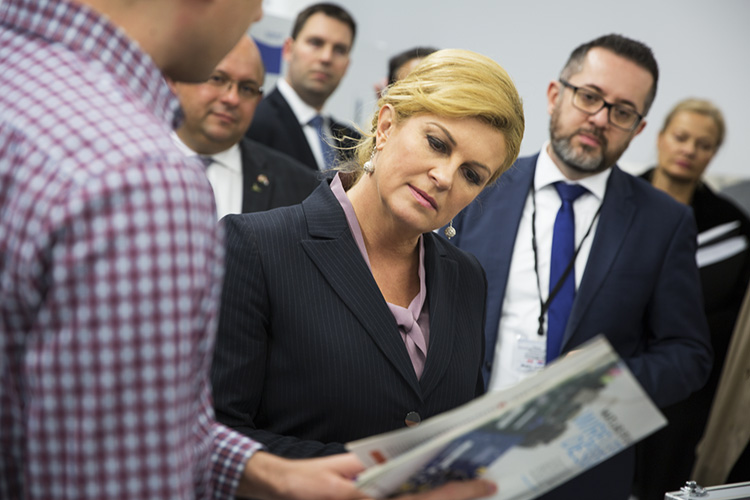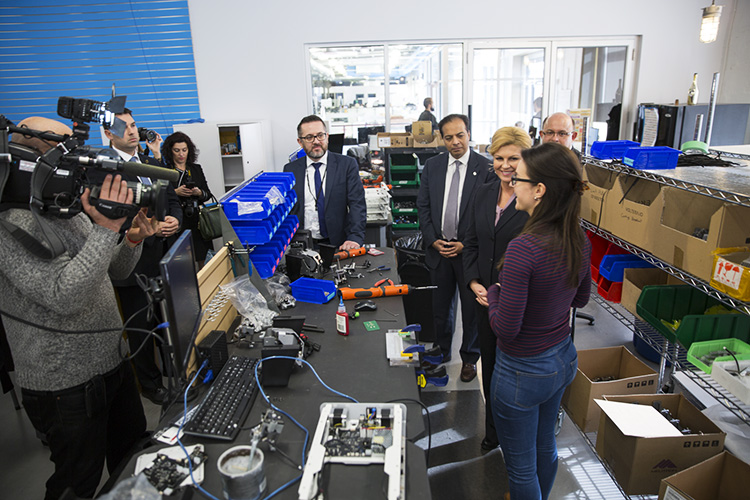With the ink just dry on the Comprehensive Economic and Trade Agreement (CETA) between Canada and the European Union, the first European head of state has come to town.
Kolinda Grabar-Kitarović, the youngest-ever President of Croatia and the first woman to hold the office, kicked off her working tour of Canada with a visit to its innovation heart: Waterloo Region. Touring the Institute for Quantum Computing and the Lazaridis Quantum-Nano Centre at the University of Waterloo — as well as Communitech and Velocity in downtown Kitchener’s Tannery building — Grabar-Kitarović got a good sampling of what Ontario’s innovation economy has to offer.

Croatian President Kolinda Grabar-Kitarović learns
about Qidni Labs’ implantable kidney replacement.
Grabar-Kitarović met with two CEOs from Communitech’s Fierce Founders program for female-led companies to hear their elevator pitches. Mallory McKewan touted her company, Bridesmade, an online rental service for bridesmaids’ dresses. Daniela Roeper talked about Borealis Wind, the company she founded to solve the problem of frozen wind turbine blades. Both were warmly received by Grabar-Kitarović.
The Croatian President also met entrepreneurs from a few Velocity companies: Vertical, a startup that makes visual intelligence tools for robots; Voltera Inc., a company making a 3D printer for circuit boards; and Qidni Labs, a nanotech startup making an implantable kidney replacement.
After the tour was a working luncheon with civic, academic, and corporate leaders from across the region. With the CETA trade deal so recently signed — in stark opposition to the protectionist, anti-trade movements expressed by the Brexit and Trump campaigns, and pointed to by pundits as a sign of hope for co-operative Western liberal democracy — the main topic of discussion was mutual prosperity.

Croatian President Kolinda Grabar-Kitarović talks to Voltera Inc.
co-founder Katarina Ilić about her company’s 3D printed circuit boards.
The secret to Waterloo Region’s broad-based and inclusive economy, Regional Chair Ken Seiling told the group, is impossible to replicate: the community mindset itself. He describes it as “very practical, very utilitarian, and always reinventing itself.”
Seiling went on to paint a picture of a community deeply respectful of its past, but with its gaze firmly set on the future: “A good portion of our economy is still agriculturally-based with a large, active, progressive agricultural community. At the same time, our manufacturing sector — though it has undergone many changes — still has just over 20 per cent of our community in manufacturing. We have a large hi-tech sector with two universities and a community college… Waterloo Region has always been forward-looking, and tried to keep everyone moving ahead of the times.”
It was a sentiment that had the Croatian delegation’s pens scratching, and was shared by many of Waterloo Region’s other leaders, like Communitech CEO Iain Klugman:
“The interesting thing about Communitech, and about this broader community, is the culture,” he said, earning nods. “We have a culture of collaboration. We work together, we pull together. We always have. Some say it’s because we were settled by middle class, German mennonites, or that we were a major settlement away from a transportation route. There are lots of reasons. But the bottom line is that we’ve always worked together. We’ve never had much of a stratified society here and that — with our ambition — is what’s made us successful.”

